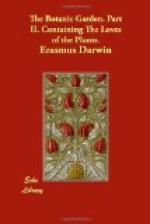B. It must require great art in the Painter or Poet to produce this kind of deception?
P. The matter must be interesting from its sublimity, beauty, or novelty; this is the scientific part; and the art consists in bringing these distinctly before the eye, so as to produce (as above-mentioned) the ideal presence of the object, in which the great Shakespear particularly excells.
B. Then it is not of any consequence whether the representations correspond with nature?
P. Not if they so much interest the reader or spectator as to induce the reverie above described. Nature may be seen in the market-place, or at the card-table; but we expect something more than this in the play-house or picture-room. The further the artists recedes from nature, the greater novelty he is likely to produce; if he rises above nature, he produces the sublime; and beauty is probably a selection and new combination of her most agreeable parts. Yourself will be sensible of the truth of this doctrine by recollecting over in your mind the works of three of our celebrated artists. Sir Joshua Reynolds has introduced sublimity even into its portraits; we admire the representation of persons, whose reality we should have passed by unnoticed. Mrs. Angelica Kauffman attracts our eyes with beauty, which I suppose no where exists; certainly few Grecian faces are seen in this country. And the daring pencil of Fuseli transports us beyond the boundaries of nature, and ravishes us with the charm of the most interesting novelty. And Shakespear, who excells in all these together, so far captivates the spectator, as to make him unmindful of every kind of violation of Time, Place, or Existence. As at the first appearance of the Ghost of Hamlet, “his ear must be dull as the fat weed, which roots itself on Lethe’s brink,” who can attend to the improbablity of the exhibition. So in many scenes of the Tempest we perpetually believe the action passing before our eyes, and relapse with somewhat of distaste into common life at the intervals of the representation.
B. I suppose a poet of less ability would find such great machinery difficult and cumbersome to manage?
P. Just so, we should be mocked at the apparent improbabilities. As in the gardens of a Scicilian nobleman, described in Mr. Brydone’s and in Mr. Swinburn’s travels, there are said to be six hundred statues of imaginary monsters, which so disgust the spectators, that the state had once a serious design of destroying them; and yet the very improbable monsters in Ovid’s Metamorphoses have entertained the world for many centuries.
B. The monsters in your Botanic Garden, I hope, are of the latter kind?
P. The candid reader must determine.
THE
LOVES
OF THE
PLANTS.
CANTO II.




